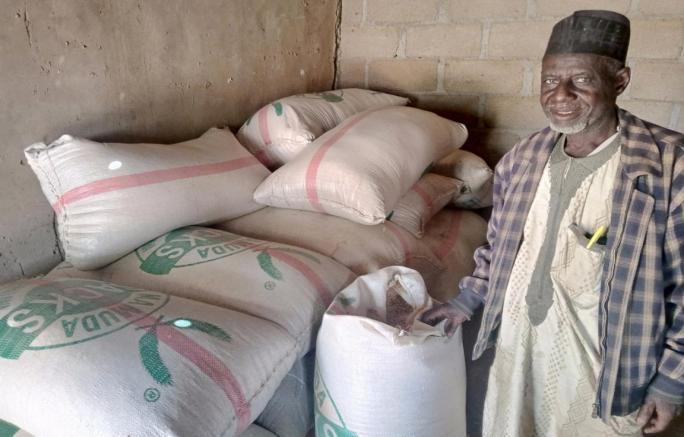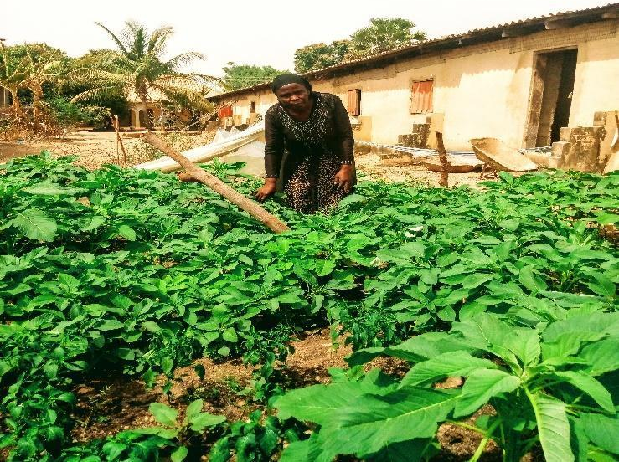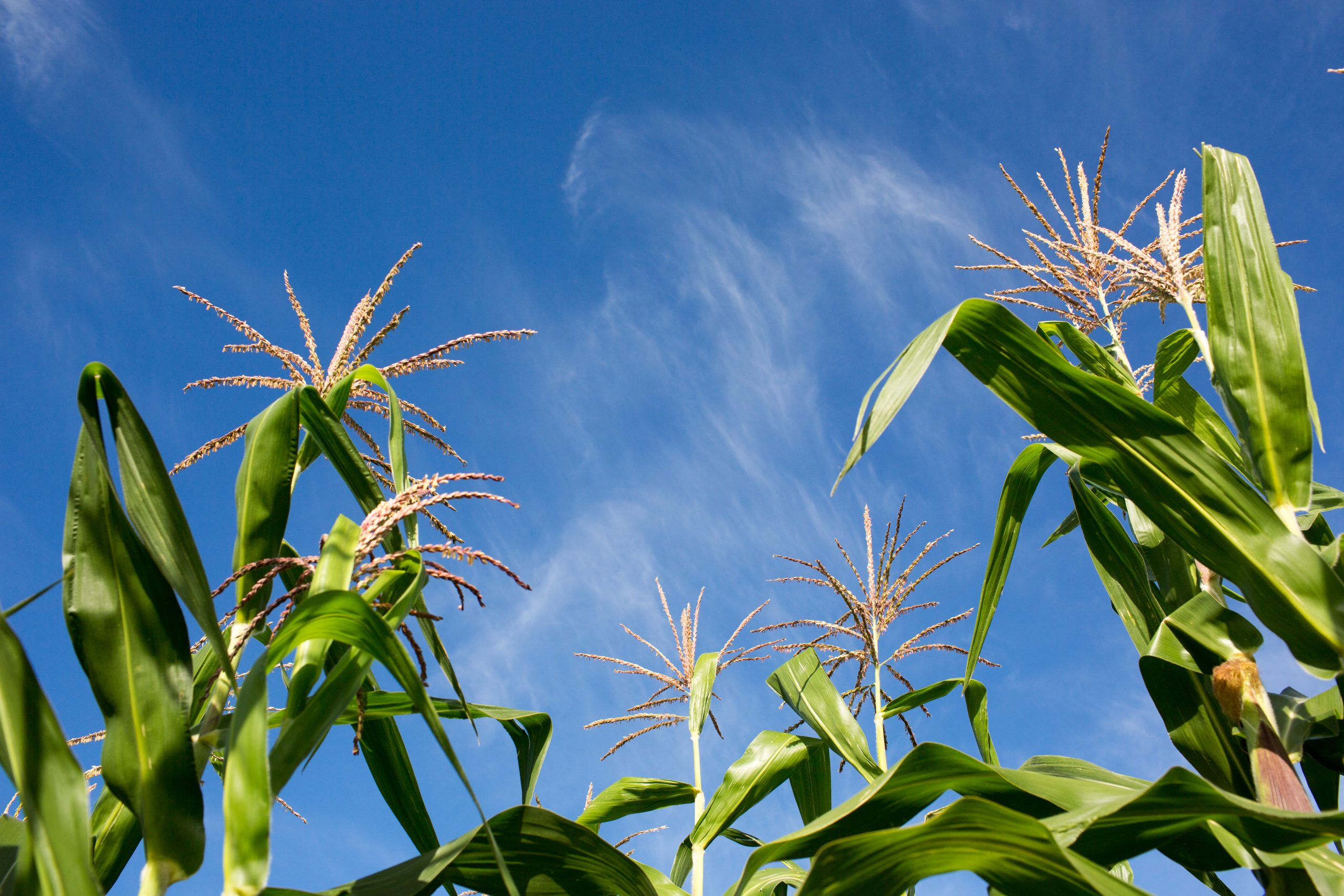In the vulnerable, marginalized communities where Nuru works, shocks are abundant and variable, from climate-related weather events and pests to conflict and political unrest. Nuru farmers are faced with the challenge of sustainably growing enough produce to support both their household nutrition and their livelihood. They need quality harvests to put food on the table and money in savings. Furthermore, rural communities depend on farmers’ successful harvests to reliably support the local food system.
In Nigeria, the challenge of farming is set against the backdrop of an all-too-recent history of violence. Nuru Nigeria works in the area formerly seized and controlled by the Boko Haram terrorist group in September 2014. ((To learn more about these attacks and the impact they had on Nuru Nigeria Managing Director Amy Gaman, you can read this article from Newsweek.)) By January 2015, the area was recaptured by the Nigerian military, and community members returned to demolished homes, ransacked businesses, and destroyed hospitals and schools. While some low-intensity conflict persists in the area, the major hostilities have ceased. Critical infrastructure has been partially but not completely rebuilt.
How Nuru Nigeria is Making a Difference
Nuru Nigeria establishes farmer cooperatives that build farmer adaptive resilience and support social cohesion while driving profitable livelihoods. These farmer-owned and farmer-led cooperatives provide farmers with market access to sell their crops, offer loans, and support financial literacy and long-term financial sustainability. Nuru aims to equip farmers to withstand shocks, such as climate-related weather events, pests, market volatility, and unexpected personal shocks that could financially impact the household.
How can we know that adaptive resilience is being built?
Nuru measures its impact on the local communities it serves by evaluating farmer income and crop yields. Last year, Nuru farmers increased their crop yields by 291%, and families increased their agricultural income from $13 to $114. As farmers continue to recover from the added shock of disruptions that resulted from COVID-19, they are also setting aside money in savings to prepare for potential future shocks. Increased crop yields and household income are important indicators for determining the adaptive resilience capacities of Nuru farmers.
Increased Crop Yields
What does this adaptive resilience building look like?

Saleh’s maize harvest improved after he joined a training session provided by his Nuru-supported cooperative.
Saleh is a 62-year-old farmer with a large family. Through his Nuru-supported cooperative, he was able to access training on best agronomic practices that support both an improved harvest and long-term sustainability. Input loans and knowledge gained from training equipped Saleh to shift his farming approach to a mixed cropping method. As a result, his harvest improved from 8-10 bags of maize alone to 16 bags of soybean and maize. Now, he has enough harvest to support his household’s nutrition, and he can sell the surplus to increase his family’s income.
Increased Income and Financial Inclusion
Farmer cooperative members benefit beyond increased income and crop yields. Members can access financial inclusion programming that includes savings groups, loans, and secure digital financial tools. By prioritizing digital financial tools as part of the financial programming, farmers face a decreased risk of theft and have increased transparency within their farmer cooperatives. Digital financial tools also equip farmers to build a portfolio of financial records, opening them up to opportunities like formal banking.
One farmer, Kachataiya, accessed loans and built up her savings through her Nuru-supported cooperative. She utilized the loans available to her to purchase supplies for weeding and harvesting. The utilization of these tools helped her to avoid crop loss. The hope that she found through her improved harvest is evident, as she has started making plans for the expansion of her farm next year. Kachataiya is quickly becoming a leader in her cooperative. She now ensures that the financial inclusion program is managed effectively.
Social Cohesion

Anselina has become more confident at irrigation farming, after receiving training from her cooperative.
As farmers work together toward shared goals through their cooperatives, their ties to one another are strengthened and social cohesion grows. One farmer, Anselina, noted “Before now our major challenges were access to finance. But with the coming of Nuru Nigeria, we can take a loan from our [cooperative] and pay it back within 3-6 months. We support each other in our group. Each member has the right to collect loans three times of her savings. At the end we shall share our contribution.” Prior to joining the cooperative, Anselina noted that she didn’t think she was capable of irrigation farming. But now, she’s been successfully participating in irrigation farming after being trained through her cooperative. Both her self-confidence and her connectedness to other farmers in her community have grown.
“Before the coming of Nuru Nigeria, we had trust issues among ourselves, but they came and brought us together and talked to us about the importance of working as a group and the great things we stand to achieve when we work together. We now trust each other and work together, especially bringing our farm produce together as a group for aggregation.” -Sule, Nuru farmer
We understand that farming will never be without its challenges and inherent risks. However, individual adaptive resiliency, built through farmer cooperatives, is tangibly shifting the trajectory of rural farming communities. Farming families are finding hope as they increase their harvests, set aside money in savings, and deepen connections with other farming families.
To read more about Nuru Nigeria’s impact, please see the 2022 Short-Term Impact Report produced in partnership with the Ray Marshall Center.


